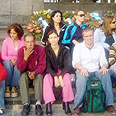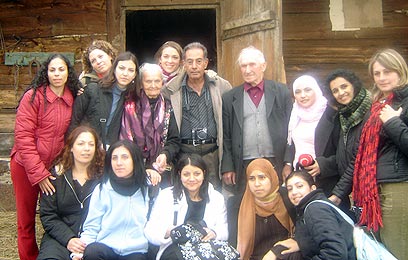
Pain as common denominator
Group of Israeli students – Jewish, Muslim and Christian – visit death camps in Poland as part of course on Holocaust, Nakba, and learning to understand each other’s stories
The journey to the death camps in Poland is a difficult experience for anyone – whether high school students, adults or of course Holocaust survivors who return to the terrible place to deal with their pain. Two weeks ago a special delegation reflecting the many angles of Israeli society, which included Jewish, Muslim and Christian students, set out on the journey there. The object of the voyage, according to its organizers, was to spark cultural and social dialogue among the groups on the basis a topic as sensitive as the Holocaust.
Thirty students – 15 Jewish and 15 Arab – from the Yizrael Valley Academic College took part in the trip as part of the course “Holocaust and Existence: Humanistic and Multicultural views of the Holocaust.” The course, like the trip itself, is unusual in its characteristics. During the first semester, students study the Holocaust, and after returning from the death camps they learn about the Nakba, which signifies for Israeli Arabs the destruction of Palestinian villages and the expulsion of Palestinians in 1948 during Israel's war of independence.

Real dialogue: the course participants (Photo: Lora Ramadan)
Course coordinator Dr. Hava Shechter explained her ideas in designing the course. “We wanted to create real and deep dialogue between Jews and Arabs while emphasizing the human aspects of the Holocaust, creating intercultural trust and understanding the sources of the rifts in our society. Our ambition was to bring Jewish and Arab students together in a situation where they could openly listen to each other and know each other’s stories.”
Dr. Shechter said that the pictures carved into her memory from the trip prove more than anything that the course was effective. “There were Muslim girls that stood hugging Jewish girls and crying together. People understand that this is the most shameful place in humanity. The issue of Jews against Arabs was erased and what remained was the human aspect,” she said.
The students tell that after the trip and the ties created among the group, their will for dialogue with the other side, to know the Palestinian perspective, and learn the other side’s pain, was sharpened.
“The Holocaust was systematic murder and the Nakba was too, but you cannot compare types of pain,” stressed Lora Ramadan, an Arab Christian student that returned from the Poland trip. “Naturally I identify more with my own pain, because it’s based on something that happened to me and my people. But the fact that I gave of myself to understand another’s pain gave me a lot of things. I cried a lot at the death camps. I am also a human and when I see a small boy that was in the Holocaust I remember that he too is a human,” Ramadan said.
Hanaan Atrash, a Muslim student, related the social pressures and opposition from those close to her about participating in the trip. “A lot of people raised their eyebrows and objected to my going. They said, and rightly so, that before I go to Poland the Jews should go see what they’re doing in the territories. They’re killing children, women, boys, so why go there and not right here? I said that I was viewing it from a human perspective. I explained that those killed in the Holocaust were just people that lost everything in one moment. They were people with dreams.”
But despite the mutual respect and willingness to open up to the other side, Atrash said that not all the Jewish students really internalized the Arab’s pain from the events of 1948. “A great number of the Jewish students had never heard of the Nakba before. We know what happened to the Jews in the Holocaust, why don’t they know of our pain?”
“Some blocked out the whole issue of the Nakba because they just ask, ‘What can justify a terrorist blowing himself up on a bus?’ We answered that our land was stolen and our families were killed. There were huge arguments. I felt that they blocked it all out because they learned something else completely than what we were telling them. We learned a lot of new things about the Holocaust, but a lot of issues weren’t resolved also.”










